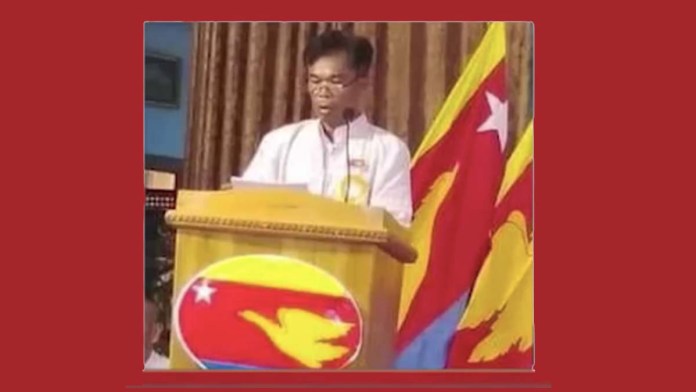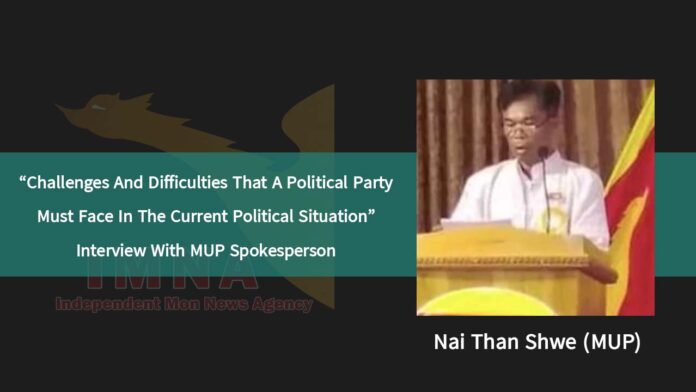The Mon Unity Party (MUP), a Mon State-based political party, was granted registration by the Union Election Commission on September 9, in accordance with Article 9 of the Political Parties Registration Law.
In light of this registration, the Mon Unity Party is addressing various matters, including its future operational procedures, its stance on the upcoming elections organized by the military council, and the challenges and difficulties that a political party must face in the current political situation. MUP spokesperson Nai Than Shwe shared insights in this interview with IMNA.

Q: How did the MUP register, and how long did it take for the UEC to approve the registration?
A: There is a new law now. After introducing the new Political Parties Registration Law, we have to register at the Union and State/Region levels. When this came into effect, we discussed it and first registered at the Union level. However, we registered at the Mon State level due to financial constraints and other challenges. We submitted our registration on March 15, 2023. Now, it’s September 9, so it’s been nearly a year and a half.
Q: What are the party’s plans now that the registration is approved?
A: This week, we will reconvene the CEC meeting to discuss how the party will proceed moving forward and further explore our strategies.
Q: The military council has announced elections in 2025. Will the MUP participate? What is your stance?
A: We’ve just heard that an election will be held. However, we don’t yet know the exact details of how this election will be conducted. The Union Election Commission (UEC) hasn’t made any announcements either. So, whether we participate in the election or not will depend on our Central Committee meeting. We will hold further meetings with our Central Executive Committee to discuss the election and other party matters and decide how to proceed. Therefore, at this moment, we can’t say anything definite.
Q: There is criticism among the public that the MUP (Mon Unity Party) is collaborating with the military. How will the MUP respond to such criticisms?
A: We registered mainly to strengthen the connection between the Mon Unity Party and the public. If we hadn’t registered, it would have been difficult for us to gather feedback and opinions from the people. Now that we are officially registered, we have the opportunity to engage in discussions legally and more easily receive input from the public. Therefore, we decided to register to enhance our communication with the community. Being registered allows us to build a closer relationship with the public.
Q: The resistance groups, including the Mon revolutionary forces, have stated that they do not accept the election and will take action against those who support or collaborate with the election process. Given this stance, what challenges could this pose for your political party?
Answer: There are undoubtedly many challenges. If an election is held, one of the main challenges will be ensuring the safety of the party’s leaders and candidates. Additionally, reform can’t be achieved only from the outside; it must also occur within the country. If we look back to the situation in 2010, many armed groups opposed the election. However, elections were held, parliaments were formed, and peace processes gradually emerged, improving the situation over time. Similarly, if an election takes place now, we believe that parliaments and governments will be established, allowing peace talks to continue, and the country’s situation could progress further. That’s our belief and perspective.
Q: Before your party was registered, some political parties that were already registered met with the military council’s peace negotiation team. During these discussions, they mentioned that instead of abolishing the 2008 Constitution, they would accept amending it step by step, and it is said that these amendments would be confirmed in the upcoming parliament. How can there be any guarantee that the military will genuinely accept amending the 2008 Constitution? What is your stance on the military’s statements?
A: This issue has two main parts. First, we need to consider whether we should amend the 2008 Constitution or draft a new one. This decision is crucial. If we aim to amend the 2008 Constitution, many political parties, including ours, would likely push to reduce or eliminate the military’s role in politics. If that’s the case, we need to think carefully about how much responsibility and accountability we expect from military leaders. At the same time, we must also consider how much responsibility political leaders can demand from the military. This is a significant challenge. Drafting a new constitution is also a complex process. There’s uncertainty about whether the military will accept such changes, which requires extensive negotiations among the top leaders. It’s a very tough task, but if possible, it would be more effective and meaningful. Much dialogue will be needed to reach a consensus.
Q: Currently, intense fighting is happening across the country, not only in border areas but even in central regions. The conflicting groups are engaged in direct clashes. However, some political parties, including yours, and certain Ethnic Armed Organizations (EAOs) believe in resolving political issues through political means. Do you believe that this conflict can be resolved through political solutions?
A: The solution must come through political means. In the end, regardless of how intense the fighting becomes, if the general public rejects the conflict, negotiations at the table will be inevitable. When that time comes, it’s not just up to us, the political parties, but also the collective voice of the people to push for these discussions. If the people actively demand negotiations, it will bring us closer to finding a solution. Additionally, international pressure will increase, urging all sides toward dialogue. Currently, the economic situation has significantly deteriorated, and the public faces rising costs and daily hardships, such as fuel shortages. As these difficulties intensify, the public will increasingly realize that dialogue is the only way forward, and their push for negotiations will accelerate the process.
Q: Any final comments on the party’s registration?
A: To determine the next steps, we will need to discuss our future course of action further in our Central Executive Committee meeting. If that is not sufficient, we will convene the Central Committee meeting to discuss and decide on our upcoming plans and strategies. Only then will we be able to outline our actions precisely.

